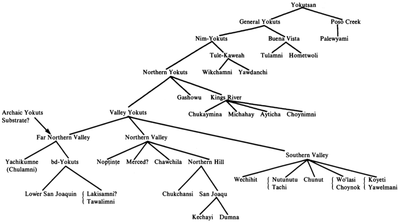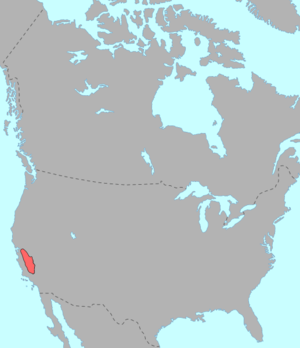Yokutsan languages
| Yokutsan | |
|---|---|
| Mariposan | |
| Ethnicity | Yokut |
| Geographic distribution | San Joaquin Valley, California |
| Linguistic classification |
|
| Subdivisions | |
| ISO 639-3 | [http://www.ethnologue.com/language/yok yok yok] |
| Glottolog | yoku1255[1] |
|
Pre-contact distribution of Yokutsan languages | |
Yokutsan (also known as Yokuts and Mariposan) is an endangered language family spoken in the interior of Northern and Central California in and around the San Joaquin Valley by the Yokut people. The speakers of Yokutsan languages were severely affected by disease, missionaries, and the Gold Rush. While descendants of Yokutsan-family speakers currently number in the thousands, most of the constituent languages are now extinct.
The Yawelmani dialect of Valley Yokuts has been a focus of much linguistic research.
Family division
The Yokutsan family consists of half a dozen languages, depending upon one's definition of the boundary between a language and a dialect. An estimated forty linguistically distinct groups existed before Euro-American contact. The following classification appears in Whistler & Golla (1986).
Poso Creek
- Palewyami Yokuts (also known as Poso Creek, Altinin)
General Yokuts (all others)
- Tulamni
- Hometwali
- Nim
-
- Wukchumni
- Yawdanchi (also known as Nutaa)
- Bokninuwad

- Northern Yokuts
-
- Chukaymina
- Michahay
- Ayitcha (also known as Aiticha, Kocheyali)
- Choynimni (also known as Choinimni)
- Valley Yokuts (see)
Speakers and language revitalization
Many Yokutsan varieties are extinct, as noted above. Those that are still spoken are endangered.
In recent years, Choinimni, Wikchamni, Chukchansi, Kechayi, Tachi, and Yawelmani all had a few fluent speakers and a variable number of partial speakers. Wikchamni, Chukchansi, Tachi, and Yawelmani were being taught to at least a few children during the first decade of the twenty-first century.
Chukchansi is now a written language, with its own alphabet developed on a federal grant. Chukchansi also has a phrase book and dictionary that are partially completed. In May 2012, the Linguistics Department of Fresno State University received a $1 million grant to compile a Chuckchansi dictionary and grammar texts,[2] and to "provide support for scholarships, programs, and efforts to assemble native texts and create a curriculum for teaching the language so it can be brought back into social and ritual use."[3]
Genetic relations
The Yokutsan family is key member family in the proposed Penutian stock. Some linguists consider most relationships within Penutian to be undemonstrated (cf. Campbell 1997). Others consider a genetic relationship between Yokutsan, Utian, Maiduan, Wintuan, and a number of Oregon languages within Penutian to be definite (cf. Delancy and Golla 1997). Regardless of higher-order disagreement, Callaghan (1997) provides strong evidence uniting Yokutsan and Utian as sub-families within a single Yok-Utian language family.
The term "Delta Yokuts" has recently been introduced in lieu of the longer "Far Northern Valley Yokuts" for the language spoken by the people in the present Stockton and Modesto vicinities of San Joaquin and Stanislaus counties, California, prior to their removal to Mission San Jose between 1810 and 1827. Of interest, Delta Yokuts contains a large number of words with no cognates in any of the other Yokuts languages, or for that matter in the adjacent Utian languages, although its syntax is typically Northern Valley Yokuts (Kroeber 1959:15-17). This anomaly has led Whistler (cited by Golla 2007:76) to suggest, "The vocabulary distinctive of some of the Delta Yokuts dialects may reflect substratal influence from pre-proto-Yokuts or from an extinct Yok-Utian language." Golla (2007:77) suggests that a "pre-proto-Yokuts" homeland was in the Great Basin, citing a rich plant and animal vocabulary for a dry environment and a close connection between Yokuts basketry styles and those of prehistoric central Nevada.
See also
References
- ↑ Hammarström, Harald; Forkel, Robert; Haspelmath, Martin; Bank, Sebastian, eds. (2016). "Yokutsan". Glottolog 2.7. Jena: Max Planck Institute for the Science of Human History.
- ↑ "Chukchansi language to be preserved with grant". abc30.com. 2:14 minutes in. Retrieved 2012-09-01. Missing or empty
|series=(help) - ↑ "Fresno State Receives $1 Million to Preserve, Revitalize Chukchansi Language". Foundation Center Philanthropy News Digest. 2012-05-13. Retrieved 2012-09-01.
- Callaghan, Catherine (1997). "Evidence for Yok-Utian". International Journal of American Linguistics. 63: 121–133. doi:10.1086/466313.
- Callaghan, Catherine (2001). "More Evidence for Yok-Utian: A Reanalysis of the Dixon and Kroeber Sets". International Journal of American Linguistics. 67 (3): 313–345. doi:10.1086/466461.
- Campbell, Lyle. (1997). American Indian Languages: The Historic Linguistics of Native America. New York, Oxford University Press.
- DeLancey, Scott; Golla, Victor (1997). "The Penutian Hypothesis: Retrospect and Prospect". International Journal of American Linguistics. 63: 171–202. doi:10.1086/466318.
- Gamble, Geoffery (1988). "Reconstructed Yokuts Pronouns". Diachronica. 5: 59–71. doi:10.1075/dia.5.1-2.04gam.
- Golla, Victor. (1964). Comparative Yokuts Phonology. University of California Publications in Linguistics (No. 34); Studies in Californian Linguistics. Berkeley, CA: University of California Press.
- Golla, Victor. (2007). "Linguistic Prehistory" in California Prehistory: Colonization, Culture, and Complexity, pp. 71–82. Jones, Terry L. and Klar, Kathryn A., editors. New York: Altamira Press. ISBN 978-0-7591-0872-1.
- Golla, Victor. (2011). California Indian Languages. Berkeley: University of California Press. ISBN 978-0-520-26667-4.
- Hockett, Charles (1973). "Yokuts As a Testing Ground for Linguistic Methods". International Journal of American Linguistics. 39 (2): 63–79. doi:10.1086/465244.
- Kroeber, A. L. (1959). Northern Yokuts. Anthropological Linguistics 1(8):1-19. Bloomington, Indiana.
- Kroeber, A. L. (1963). Yokuts Dialect Survey. University of California Anthropological Records 11(3):177-251. Berkeley.
- Mithun, Marianne. (1999). The Languages of Native North America. Cambridge: Cambridge University Press. ISBN 0-521-23228-7 (hbk); ISBN 0-521-29875-X.
- Newman, Stanley S. (1944). Yokuts Language of California. Viking Fund Publications in Anthropology No. 2. New York.
- Newman, Stanley S. (1946). The Yawelmani Dialect of Yokuts. Linguistic Structures of Native America, pp. 222–248, C. Osgood, ed., Viking Fund Publications in Anthropology No. 6. New York.
- Powell, John Wesley Powell. (1891). Indian Linguistic Families of America, North of Mexico, Washington: Government Printing Office, pages 90–91.
- Whistler, Kenneth; Golla, Victor (1986). "Proto-Yokuts Reconsidered". International Journal of American Linguistics. 52 (4): 317–358. doi:10.1086/466028.
External links
- Yokuts
- Yokuts languages fonts, Languagegeek.com
- Yokuts (Northern Foothill): Lord's prayer
- Chawchila metathesis
- Native Tribes, Groups, Language Families and Dialects of California in 1770 (map after Kroeber)
- Yokuts languages language overview at the Survey of California and Other Indian Languages
- "OLAC resources in and about the Yokuts language". Retrieved 2012-07-30.
- "General Yokuts – California Language Archive". Retrieved 2012-07-30.
